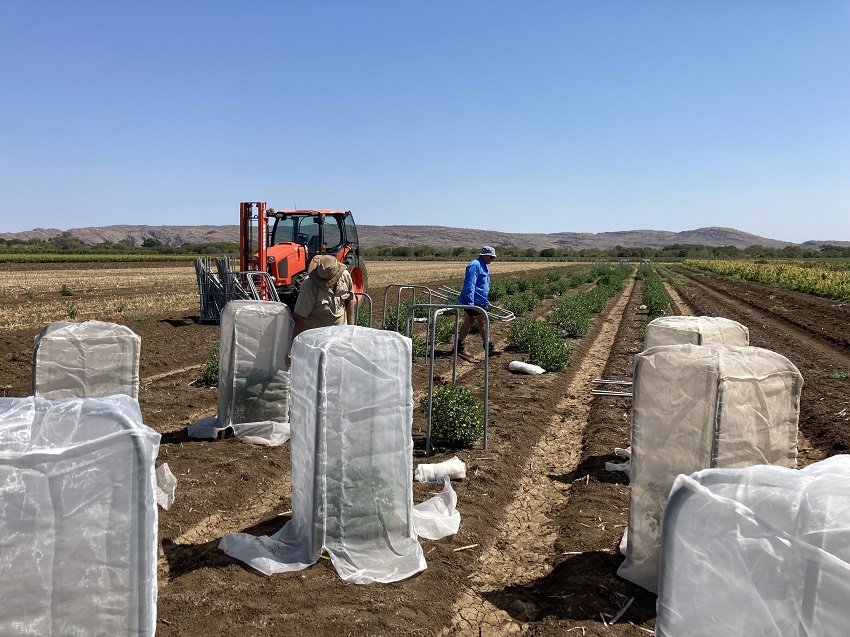
The development of Western Australia’s fledgling safflower industry is being supported by a series of research trials in the north of the State.
The Department of Primary Industries and Regional Development (DPIRD) recently harvested two trials under contract for commercial safflower company GO Resources at its Frank Wise Institute of Tropical Agriculture at Kununurra.
DPIRD has a long association with safflower trials, having hosted CSIRO research at the Kununurra site, which saw the development of a new safflower variety with more than 90 per cent oleic acid, known as a Super High Oleic (SHO) line.
SHO safflower oil is suitable for the global industrial lubricant market, as well as for use as a healthy oil in food and in personal care products.
The current DPIRD trial harvest included a variety trial of five safflower selections from the United States, which were evaluated as potential ‘elite’ parents for future SHO safflower varieties.
The trial compared the performance of these lines with the current commercial SHO safflower variety E40-R.
A separate variety trial also harvested four, second generation SHO safflower varieties, which were developed in Australia by the CSIRO and GO Resources.
The field trials were part of an extensive research program undertaken by GO Resources across the WA Grainbelt in 2021, which included variety evaluation and a range of agronomy trials.
In addition to the research trials, DPIRD harvested a 22 hectare field of E40-R SHO safflower seed stock, which is being bulked up for the first commercial crops to be planted in the WA Grainbelt in 2022.
DPIRD horticulture and irrigated agriculture research support manager Mark Warmington said the department had amassed a vast amount of knowledge about how to best manage SHO safflower trials in the north over the past nine years.
“The variety trial compared six replicates of the US safflower selections against the control line and assessed each for yield, time to flowering, oleic content and total oil content,” he said.
“Another trial evaluating third generation SHO safflower lines was extremely intensive, as it involved sowing individual seeds into pots in a shade house, testing the leaf material for purity and then planting them in a field with each plant being covered by a pollination tent to prevent cross-pollination between lines at flowering.
“These plants were then individually harvested by hand and thrashed prior to inclusion in a seed increase program, which is based on the need for all seeds to be true to type and genetic purity.
“The team has also grown single plants of the US selections under pollination tents, as part of a pure line strategy for evaluating yield, total oil content, total oleic content and crop uniformity.”
The department will now collate the data and information on the trials and report to GO Resources, as part of its commercial contract.
GO Resources research and development manager David Hudson said DPIRD’s expertise had been invaluable in the development of the new SHO safflower lines.
“The department’s Kununurra trials are an important part of the package of field trials our company is undertaking across the WA Wheatbelt,” he said.
“The northern location also allows for out of season safflower production to bulk up seed for the Wheatbelt and interstate plantings.”
Mr Hudson said the 2021 northern field trials had produced some encouraging results.
“All of the lines being evaluated at the Frank Wise Institute as potential replacements for our current commercial line E40-R generated improvements in yield and total oil content, while maintaining the 90 plus per cent oleic content,” he said.
“We are now waiting to see how these results compare with similar trials undertaken across the WA Wheatbelt.”
Picture caption: DPIRD has been working on field trials to assist the State’s fledging safflower industry to grow, which included covering individual plants with a pollination tent to prevent cross-pollination between lines at flowering.
Media contacts:
Mark Warmington, horticulture & irrigated ag research support manager, DPIRD (research trial logistics)
+61 (0)8 9166 4054
David Hudson, research and development manager, GO Resources (project detail, trial results)
+61 (0)418 951 479
Megan Broad/Katrina Bowers, media liaison
+61 (0)8 9368 3937


